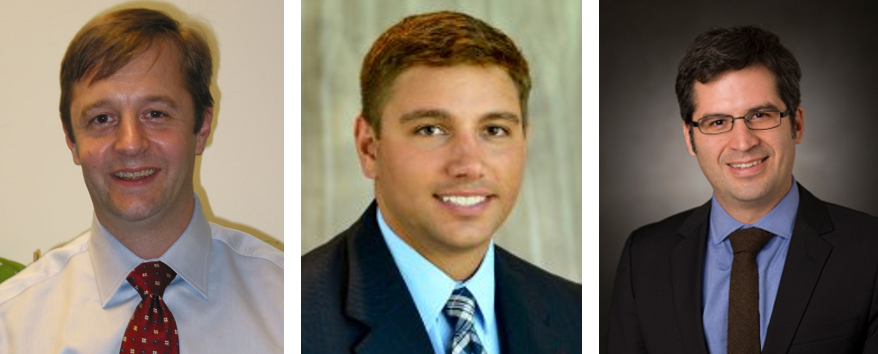
ICDS awards seed funding for Inter-Institutional Partnerships for Diversifying Research
Posted on September 12, 2023The Institute for Computational and Data Sciences awarded seed funding for two innovative proposals as part of the Inter-Institutional Partnerships for Diversifying Research (IPDR) Program, in the Computational & Data Science track (ADOPTS). Both proposals will build robust and dynamic cross-institutional scientific partnerships.
Dr. Jeremy Blum from the School of Science, Engineering and Technology at Penn State Harrisburg, and Dr. Tyler Love from the Department of Teacher Education at Penn State Harrisburg are co-PIs on their proposal entitled “Leveraging Generative Artificial Intelligence to Broaden Participation in Competitive Programming”. Their work will develop a partnership between Penn State Harrisburg and the University of Maryland Eastern Shore (UMES) with the goal of creating a series of competitive programming events aimed at both high school and undergraduate students to utilize generative AI systems to aid them in solving contest problems, thereby providing a view into the impact of generative AI tools on the future of work. IPDR seed funding will help advance collaborative research with UMES to foster scientific exposure and engagement, leading to impactful programming competitions to encourage students to pursue computer science education and careers.
Dr. Alfonso Mejia from the Civil and Environmental Engineering department in the College of Engineering at University Park submitted his proposal entitled “Understanding and predicting high-impact weather, climate, and hydrologic events via data assimilation, artificial intelligence, and a diverse workforce development”. This proposal takes the initiative to build a partnership between Penn State, Morgan State University, Howard University, and the University of Maryland Baltimore County. IPDR seed funding will help advance collaborative research by enhancing the diversity of participants in geosciences through impactful research projects, collaborative activities, and student recruiting.
Share
Related Posts
- Professor receives NSF grant to model cell disorder in heart
- Featured Researcher: Nick Tusay
- Multi-institutional team to use AI to evaluate social, behavioral science claims
- NSF invests in cyberinfrastructure institute to harness cosmic data
- Center for Immersive Experiences set to debut, serving researchers and students
- Distant Suns, Distant Worlds
- CyberScience Seminar: Researcher to discuss how AI can help people avoid adverse drug interactions
- AI could offer warnings about serious side effects of drug-drug interactions
- Taking RTKI drugs during radiotherapy may not aid survival, worsens side effects
- Cost-effective cloud research computing options now available for researchers
- Costs of natural disasters are increasing at the high end
- Model helps choose wind farm locations, predicts output
- Virus may jump species through ‘rock-and-roll’ motion with receptors
- Researchers seek to revolutionize catalyst design with machine learning
- Resilient Resumes team places third in Nittany AI Challenge
- ‘AI in Action’: Machine learning may help scientists explore deep sleep
- Clickbait Secrets Exposed! Humans and AI team up to improve clickbait detection
- Focusing computational power for more accurate, efficient weather forecasts
- How many Earth-like planets are around sun-like stars?
- SMH! Brains trained on e-devices may struggle to understand scientific info
- Whole genome sequencing may help officials get a handle on disease outbreaks
- New tool could reduce security analysts’ workloads by automating data triage
- Careful analysis of volcano’s plumbing system may give tips on pending eruptions
- Reducing farm greenhouse gas emissions may plant the seed for a cooler planet
- Using artificial intelligence to detect discrimination
- Four ways scholars say we can cut the chances of nasty satellite data surprises
- Game theory shows why stigmatization may not make sense in modern society
- Older adults can serve communities as engines of everyday innovation
- Pig-Pen effect: Mixing skin oil and ozone can produce a personal pollution cloud
- Researchers find genes that could help create more resilient chickens
- Despite dire predictions, levels of social support remain steady in the U.S.
- For many, friends and family, not doctors, serve as a gateway to opioid misuse
- New algorithm may help people store more pictures, share videos faster
- Head named for Ken and Mary Alice Lindquist Department of Nuclear Engineering
- Scientific evidence boosts action for activists, decreases action for scientists
- People explore options, then selectively represent good options to make difficult decisions
- Map reveals that lynching extended far beyond the deep South
- Gravitational forces in protoplanetary disks push super-Earths close to stars
- Supercomputer cluster donation helps turn high school class into climate science research lab
- Believing machines can out-do people may fuel acceptance of self-driving cars
- People more likely to trust machines than humans with their private info
- IBM donates system to Penn State to advance AI research
- ICS Seed Grants to power projects that use AI, machine learning for common good
- Penn State Berks team advances to MVP Phase of Nittany AI Challenge
- Creepy computers or people partners? Working to make AI that enhances humanity
- Sky is clearing for using AI to probe weather variability
- ‘AI will see you now’: Panel to discuss the AI revolution in health and medicine
- Privacy law scholars must address potential for nasty satellite data surprises
- Researchers take aim at hackers trying to attack high-value AI models
- Girls, economically disadvantaged less likely to get parental urging to study computers
- Seed grants awarded to projects using Twitter data
- Researchers find features that shape mechanical force during protein synthesis
- A peek at living room decor suggests how decorations vary around the world
- Interactive websites may cause antismoking messages to backfire
- Changing how government assesses risk may ease fallout from extreme financial events
- Penn State’s Leadership in AI Research
- ICS co-sponsors Health, Environment Seed Grant Program
- Penn State industrial engineering to host national simulation workshop
